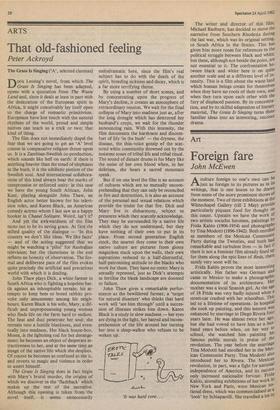ARTS
That old-fashioned feeling
Peter Ackroyd
The Grass Is Singing ('A', selected cinemas)
Doris Lessing's novel, from which The Grass Is Singing has been adapted, opens with a quotation from The Waste Land and, since it deals at least in part with the desiccation of the European spirit in Africa, it might conceivably lay itself open to the charge of romantic primitivism. Europeans have lost touch with the natural rhythms of the world, proud and simple natives can teach us a trick or two; that kind of thing.
The film does not immediately dispel the fear that we are going to get an 'A' level course in comparative religion thrust upon us. It is a Zambian-Swedish co-production, which sounds like hell on earth: if there is anything heavier than the tread of elephants in the bush, it is the nihilistic pietism of the Swedish soul. And international collabora- tions of this kind always bear the marks of compromise or enforced unity: in this case we have the young South African, John Kani, playing alongside John Thaw, an English actor better known for his televi- sion roles, and Karen Black, an American comedy actress whom I last saw as a happy hooker in Chanel Solitaire. Weird, isn't it?
And yet the awkwardness of the film turns out to be its saving grace. At first the stilted quality of the dialogue — 'In this country we don't like ideas. We like facts' — and of the acting suggested that we might be watching a 'pilot' for Australian television; but the clumsiness in the end reflects an honesty of observation. The for- mal and deliberate pace of the film evokes quite precisely the artificial and precarious world with which it is dealing.
John Thaw plays Dick, a white farmer in South Africa who is fighting a hopeless bat- tle against an inhospitable terrain; his at- tempts to keep bees or breed rabbits pro- voke only amusement among his neigh- bours. Karen Black is his wife, Mary, a dif- ficult and unprepossessing young woman who finds life on the farm hard to endure. The heat and dust penetrate her soul: she retreats into a hostile blankness, and even- tually into madness. Her black house-boy, Moses, is the lightning rod for her derange- ment: he becomes an object of desperate at- tractiveness to her, and at the same time an image of the native life which she despises. Of course he becomes as confused as she is, and reverts to magic and violence in order to assert himself.
The Grass Is Singing does in fact begin with Mary's brutal murder, the origins of which we discover in the 'flashback' which makes up the rest of the narrative. Although this opening is taken from the novel itself, it seems unnecessarily
melodramatic here, since the film's real subject has to do with the death of the spirit, breeding sickness and decay, which is a far more terrifying theme.
By using a number of short scenes, and by concentrating upon the progress of Mary's decline, it creates an atmosphere of extraordinary tension. We wait for the final collapse of Mary into madness just as, after the long drought which has destroyed her husband's crops, we wait for the thunder announcing rain. With this intensity, the film documents the harshness and discom- fort of life 'in the bush' — the dryness, the disease, the thin-voice gossip of the scat- tered white community drowned out by the insistent tones of tribal life and tribal ritual. The sound of distant drums is for Mary like the noise of her own blood when, in her delirium, she hears a sacred mountain speak.
But if on one level the film is an account of cultures which are so mutually uncom- prehending that they can only be reconciled in fire and destruction, it is also an account of the personal and sexual relations which provide the tinder for that fire. Dick and Mary live in disharmony, subject to pressures which they scarcely acknowledge. They may be surrounded by a native life which they do not understand, but they have nothing of their own to put in its place. From second generation English stock, the nearest they come to their own native culture are pictures from glossy magazines stuck upon the walls, their own aspirations reduced to a half-distrustful, half-patronising attitude to the blacks who work for them. They have no roots: Mary is sexually repressed, just as Dick's attempts to fertilise the bleak landscape are doomed to failure.
John Thaw gives a remarkable perfor- mance as the bewildered farmer, a 'target for natural disasters' who thinks that hard work will 'see him through' until a succes- sion of illnesses strikes him down. Karen Black is a study in slow madness — her eyes are dying in the light, her hatred and incom- prehension of the life around her turning her into a sleep-walker who refuses to be woken up.
'It was hard core... The writer and director of this film, Michael Raeburn, has decided to move the narrative from Southern Rhodesia during the last war, which was its original setting, to South Africa in the Sixties. This has given him more room for references to the political struggle between black and white; but these, although not beside the point, are not essential to it. The confrontation be- tween black and white here is on quite another scale and at a different level of in- tensity. This is a film about the waste land which human beings create for themselves when they have no roots of their own, and when they turn upon each other with the fury of displaced passion. By its concentra- tion, and by its skilful adaptation of literary material, The Grass Is Singing turns these familiar ideas into an interesting, succinct drama.






































 Previous page
Previous page